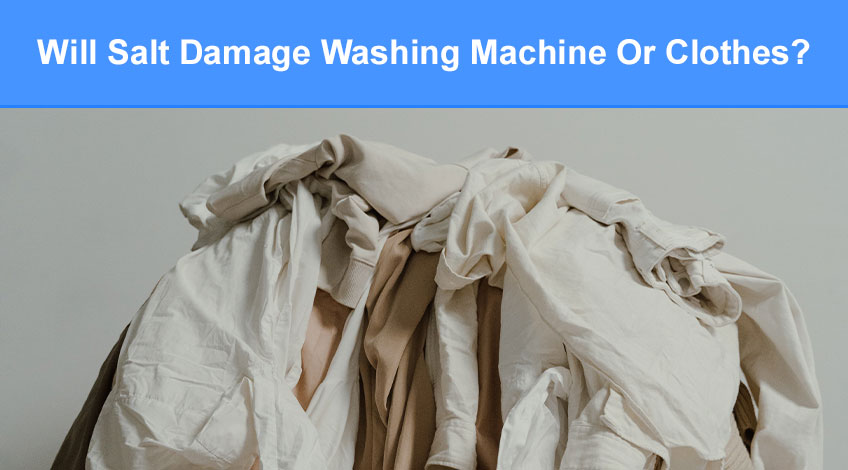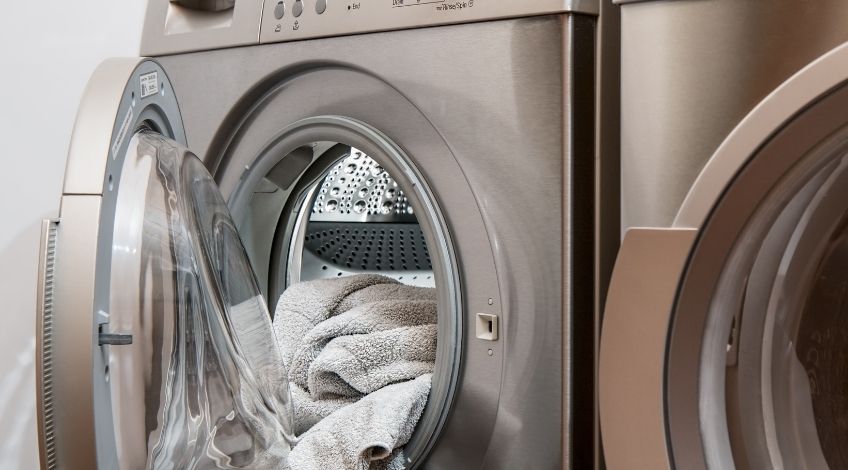
Will Salt Damage My Washing Machine Or Clothes?
Salt is a common ingredient that can be found in almost every kitchen. We put it on our chips, use it when baking and put it on many of our meals.
Many people are now using salt on their laundry and claim it has numerous benefits for washing clothes and stain removal. But, does salt damage the clothes and what about the washing machine does salt have an adverse affect on it?
We looked into these and other questions relating to salt and laundry, keep reading to see what we found.
Will Salt Damage Clothes?
Salt is typically a safe ingredient and as long as it’s used correctly, it shouldn’t cause any damage to your clothes at all.
With that being said, if you don’t use it properly, salt can potentially cause damage to your clothes.
Salt is naturally abrasive which makes it great for removing many stubborn stains, removing grease and gravy and it can be used as a fabric softener too.
What Damage Can Salt Do to Clothes?
Salt can cause problems in the wash as well, but using salt at the recommended amounts and in the advised ways should not cause any of the following to occur.
Salt Stains
If the laundry that has been treated with salt isn’t rinsed thoroughly, the clothes are likely to have a white salt residue left on them. They will also feel stiff and starchy.
This can happen on hard wearing workwear and delicate items of clothing too. But there is likely to be more damage on delicate silk or woollen items.
If the salt is allowed to remain on the clothes for too long, they will have a crunch-like feel to them and they might start to fade due to the salt’s abrasive action.
You should always ensure that clothes subjected to a salt treatment are thoroughly rinsed to ensure all of the salt is removed. This might entail giving your clothes an additional rinse cycle just to be sure.
Holes, Rips & Tears
If you allow your clothes to soak in a saltwater solution for too long, it can weaken the fibres of the material. This is possible on every fabric, but is more likely to cause damage to more delicate items.
In some cases excessive salt residue can cause fabrics to shrink. Which is why it is so important that salt is rinsed completely from the clothes.
You don’t want your clothes to feel like your swimming costume does on the 2nd day of wearing it to the beach. You know, that crusty, crunchy feeling because you forgot to wash it the night before.
Faded Colours
Salt is used as a mordant in clothes mills to help the fabric absorb the dye. But it can actually cause some colours to fade, specially reds and dark blues.
You should never leave these darker colours soaking in a saltwater solution for too long because this is likely to lead them to become faded.
Set Stains
Unless you accurately follow the cleaning instructions when trying to remove a stain using salt, you could actually make things worse, not better.
If you use the wrong quantity of salt or use hot water you could actually damage your clothes. In extreme cases, it’s possible to make the stain set into the fabric instead of removing it.
Turn Materials Brittle
Salt can dry out some materials to the point that they become brittle. We saw earlier that it’s not a good idea to use salt on delicate items like wool or silk.
But there are materials that can become severely damaged if exposed to salt, These materials include leather and suede which will become too dry and brittle if exposed to salt.
The suede or leather will become so brittle that the fibres will begin to break down which will lead to the material splitting.
The Safe Way To Treat Clothes Using Salt
If it’s used properly, salt can be a great addition to your cleaning cupboard. Below are a few handy pointers on how to use salt in your laundry. You should always;
- Do A Patch Test
To prevent ruining your clothes, it’s always best to perform a patch test before using salt. All you need to do is mix up a saltwater solution and dab some on an unobtrusive area (an inside seam, under the collar, an inside hem), then wait for 1 to 2 hours and see if anything bad happens. - Use The Least Amount Of Salt You Can
If you always start off using a small amount of salt, there’s less chance of causing any lasting damage to the garment. You can always add more later if you need to. - Dilute Salt Before Using
You should never treat any clothes using undiluted salt. By mixing the salt with water, you will be treating your clothes with a weaker version which is less likely to cause any damage. - Thoroughly Rinse Your Clothes
To prevent any staining or damage to the fabric, you should always thoroughly rinse any clothes that have been treated with a salt solution. - Don’t Over Soak Your Clothes In Salt
There’s an old saying that says “if in doubt, leave it out” and nothing could be more appropriate than that when soaking clothes in saltwater. Salt is a great stain remover and fabric softener as long as you don’t allow your clothes to soak in a saltwater solution for too long. We recommend soaking your clothes for 30 minutes and then inspecting them to see what effect the salt is having on the clothes. If all’s well, and the stain is still visible, soak for another ½ hour and so on. - If In Doubt, Use Something Else
Salt is usually quite safe to use on your clothes but if you have any doubts there are many other products that can be used for specific problems.

Can You Put Salt In The Washing Machine?
You can put salt in the washing machine to help remove stains from your clothes. As salt is a natural product it is safe to use and relatively gentle on your clothes.
Salt is also an inexpensive way to remove stains and soften your clothes. Before using salt in your washing machine, it’s best to follow these points;
- If possible use kosher salt or pickling salt as these types of salt will leave less residue than table salt.
- You should also never use more salt than is absolutely necessary as this is not only a waste of salt, but too much salt can damage your clothes.
- Always put the salt into the washing machine before adding the clothes.
Where Should The Salt Be Put In The Machine?
The best place to add the salt to the machine is in the detergent dispenser drawer. This ensures that it gets distributed evenly and doesn’t damage your clothes.
Why Use Salt In The Washing Machine?
Using salt in the washing machine is not only good for removing stains and softening the fabric of your clothes. It also helps to soften the water which has a positive effect on your washing machine.
Because the water is softer, you will find the detergent goes farther and in many cases, you will not need to use so much detergent.
Are There Any Reasons Why Salt Should Not Be Used In The Washing Machine?
As any car owner will tell you, salt can be corrosive to metal. Using salt in your washing machine means exposing it to this corrosive chemical.
However, as long as you use an extra rinse cycle, your machine should not have any adverse effects from using salt.
SEE ALSO: How To Get Rid Of Smells In A Washing Machine
Frequently Asked Questions
Salt can be bad for your washing machine if it is allowed to remain on the metal parts of the machine. However, as long as you use an extra rinse cycle, you can use salt in your washing machine without any adverse effects.
Salt can ruin your clothes if it remains on your clothes for too long. You should always thoroughly rinse your clothes to remove any salt residue.
The best salt to use for soaking clothes is table salt. The best salt to use in a washing machine is Kosher salt or pickling salt as they leave less residue than other types of salt.
To remove any salt residue from your washing machine, run an extra rinse cycle.
Table salt does remove stains from clothes. Different stains need to be treated differently. For example; wine should be covered in salt and then continuously dabbed with water until the stain disappears, grease should be covered in salt and the salt will absorb most of the grease.




